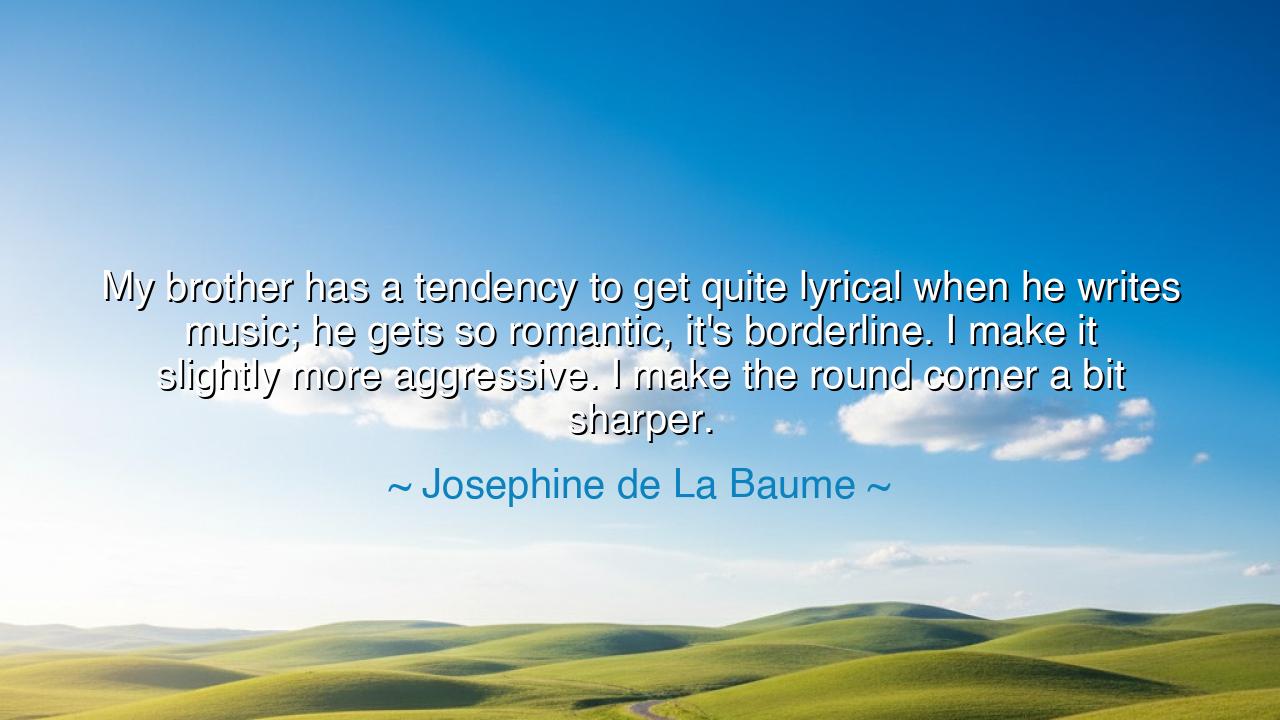
My brother has a tendency to get quite lyrical when he writes
My brother has a tendency to get quite lyrical when he writes music; he gets so romantic, it's borderline. I make it slightly more aggressive. I make the round corner a bit sharper.






The words of Josephine de La Baume—“My brother has a tendency to get quite lyrical when he writes music; he gets so romantic, it’s borderline. I make it slightly more aggressive. I make the round corner a bit sharper.”—reveal the eternal dialogue between softness and strength, between romance and force, between melody that soothes and rhythm that strikes. In her reflection, she unveils a truth older than the ages: that all creation arises not from harmony alone, nor from conflict alone, but from the balance of both.
Her brother, she says, leans toward the lyrical, toward lines that flow gently, tenderly, like water over stone. His art moves toward the romantic, overflowing with sweetness, delicacy, and perhaps even sentiment that risks excess. Into this music she enters, not to destroy but to shape, adding sharpness, power, and edge. The round corner becomes sharpened, the song becomes not only gentle but strong. In this, de La Baume embodies the artist’s role as sculptor of balance—where one hand offers softness, the other firmness, and together they create something complete.
This dance between romance and aggression is not new. In the age of the Renaissance, Michelangelo sculpted David, a figure both beautiful and fierce. The curves of the body were tender, graceful, almost romantic in form, yet within those curves lay power, tension, and defiance. His masterpiece, like de La Baume’s music, was born of the marriage between lyricism and aggression. Too soft, and it would have lacked strength. Too harsh, and it would have lacked beauty. Only in their union did it become immortal.
History also gives us the partnership of Lennon and McCartney. McCartney’s gift was for melody, warmth, and sweetness—romantic in tone, accessible to the heart. Lennon, by contrast, often brought edge, rawness, and bite, sharpening the corners of McCartney’s gentleness. Together they forged songs that neither alone could have created: works both tender and bold, lyrical and aggressive. De La Baume and her brother echo this eternal principle, showing how art flourishes when contrasting energies collide, refine, and reshape one another.
The meaning of her words is that true creation does not lie in one extreme. Too much romance, and art dissolves into sentimentality. Too much aggression, and it becomes harsh noise. But when balanced, when the romantic heart meets the assertive hand, the result is powerful, memorable, alive. She confesses her role not to diminish her brother’s lyricism, but to refine it, to bring contrast that magnifies its beauty. For light shines brightest when set against shadow, and melody is sweetest when given rhythm and force.
The lesson for us is this: do not fear tension in your work, your relationships, or your soul. Balance the romantic with the bold, the soft with the sharp, the heart with the will. Seek not comfort in one alone, but strength in their union. If you are too gentle, learn to sharpen your edges. If you are too harsh, learn to soften your tone. For it is in this balance that art, and life, find their truest expression.
Practically, this means welcoming collaboration, even with those whose instincts differ from your own. If you are surrounded by dreamers, learn to ground them. If you are surrounded by pragmatists, dare to lift them with vision. In your own work, ask: Where can I soften my sharpness, or sharpen my softness? Let your life, like de La Baume’s music, be both lyrical and strong, romantic and fierce, a harmony of seeming opposites.
Thus, Josephine de La Baume teaches us that creation thrives in contrast. The round corner must sometimes be sharpened, and the sharpened edge must sometimes be softened. Between romance and aggression lies the true art of balance—and in that balance, beauty is born that can outlast time itself.






AAdministratorAdministrator
Welcome, honored guests. Please leave a comment, we will respond soon